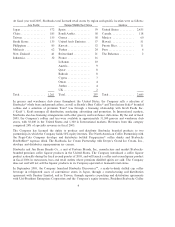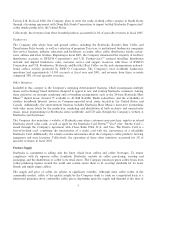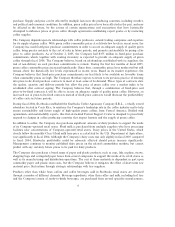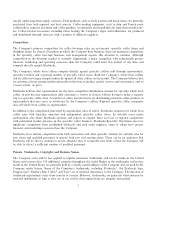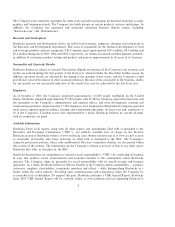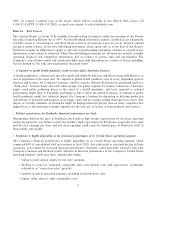Starbucks 2005 Annual Report Download - page 16
Download and view the complete annual report
Please find page 16 of the 2005 Starbucks annual report below. You can navigate through the pages in the report by either clicking on the pages listed below, or by using the keyword search tool below to find specific information within the annual report.management believes it has structured the Company's China operations to comply with local laws, there are
substantial uncertainties regarding the interpretation and application of laws and regulations and the
enforceability of intellectual property and contract rights in China. If China's governmental authorities were
ultimately to conclude that Starbucks has not complied with one or more existing or future laws or regulations,
or if their interpretations of those laws or regulations were to change over time, the Company's affiliates could
be subject to fines and other financial penalties or forced to cease operations entirely. Moreover, it could
adversely affect the Company's business if it is unable to enforce its intellectual property and contract rights in
China's courts.
Additionally, Starbucks plans to enter selected markets in other developing countries (such as Russia, India
and Brazil) as an important part of the projected growth of the International operating segment. Some of
those markets pose legal and business challenges similar to the China market, such as substantial uncertainty
regarding the interpretation and application of laws and regulations and the enforceability of intellectual
property and contract rights.
‚Failure of the Company's internal control over financial reporting could harm its business and financial
results.
The management of Starbucks is responsible for establishing and maintaining adequate internal control over
financial reporting. Internal control over financial reporting is a process to provide reasonable assurance
regarding the reliability of financial reporting for external purposes in accordance with accounting principles
generally accepted in the United States of America. Internal control over financial reporting includes
maintaining records that in reasonable detail accurately and fairly reflect the Company's transactions;
providing reasonable assurance that transactions are recorded as necessary for preparation of the financial
statements; providing reasonable assurance that receipts and expenditures of the Company's assets are made
in accordance with management authorization; and providing reasonable assurance that unauthorized
acquisition, use or disposition of the Company assets that could have a material effect on the financial
statements would be prevented or detected on a timely basis. Because of its inherent limitations, internal
control over financial reporting is not intended to provide absolute assurance that a misstatement of the
Company's financial statements would be prevented or detected. The Company's rapid growth and entry into
new, globally dispersed markets will place significant additional pressure on the Company's system of internal
control over financial reporting. Any failure to maintain an effective system of internal control over financial
reporting could limit the Company's ability to report its financial results accurately and timely or to detect and
prevent fraud.
14


